Things are getting back into full swing with this week’s TV roundup, and we’ve got a wide-ranging look at some of winter’s finest televised offerings for your reading pleasure!
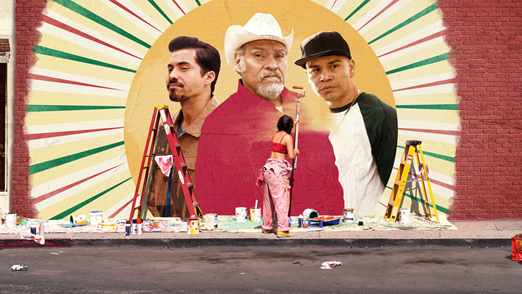
GENTEFIED (Netflix)
No, not gentrified. Well, sort of. GENTEFIED, the Mexican-led Netflix dramedy, is an extremely modern look at the Mexican-American experience, specifically the experience of those living in Los Angeles with one foot in their Mexican heritage and one foot in trying to make it through American capitalistic society. When three cousins with varying levels of respect for one another band together to help stop the family restaurant in Boyle Heights from going under due to gentrification, they decide to go with a “if you can’t beat ‘em, join ‘em,” attitude, attempting to gentrify their own place before it is taken out from underneath them. I do think that this show will have a particular resonance to its Latinx viewers—as a white viewer, a lot of it went over my head, but I was still impressed with many of the themes inspecting what it means to stay connected to your heritage while attempting to build a life for yourself, and the inspection of the marginalization of Mexican-Americans in Los Angeles, while still being able to keep a light and funny tone. It’s a unique point of view that isn’t often seen in media, and it is certainly worth a watch for everyone, even if they may not feel personally or culturally connected to the material. [Anna Mansager]
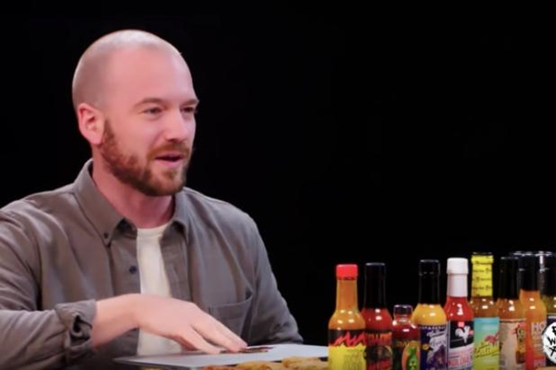
HOT ONES: THE GAME SHOW (truTV)
It just never gets old. I was a fan of the HOT ONES series of interviews before I learned about this game show adaptation, and it delivers the same flavor of timeless joy that is watching others suffer. The premise is excruciatingly simple. Two teams of two play very normal game show games: trivia, name the celeb, stuff like that. The kicker is that between every round, they have to ingest a ridiculously spicy wing. This is followed by involuntary spasms, profuse sweating, and possibly a trip to the vomit bucket. What’s more is that unlike the interview series, contestants do not receive any water or milk.
Also unlike the interview series, where the reward for finishing is just a chance to plug something, winners of the game show get a whole $25,000 and a milkshake. The pilot episode featured a contest between two normal people and two New Yorkers. One of the normals vomits in the first round, but they rally late in the game and win the whole thing. It’s impossible not to grin as two people euphorically celebrate the fact that their pointless suffering became a little less pointless. [Dan Blomquist]
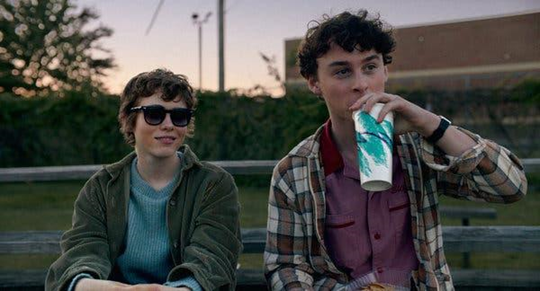
I AM NOT OKAY WITH THIS (Netflix)
I haven’t felt so connected to the main character of a television show since the end of DARIA. Considering I AM NOT OKAY WITH THIS on Netflix begins with Syd, its teenage protagonist, running down the street covered in blood, I’m not sure what that says about me. She is awkward, she’s uncomfortable, she feels everyone around her is an idiot and doesn’t get her. It’s like looking in a mirror and seeing my high school self, except for the superpowers part. Oh, yeah. Did I mention Syd has superpowers? Just like any super-powered person worth their salt, Syd’s powers start to manifest when she’s starting to feel completely overwhelmed by her world. She’s the new kid in town, she’s trying to deal with her dad’s semi-recent suicide, her best (and only) friend is dating a guy Syd can’t stand, not to mention puberty on top of all that. The whole thing is bookended by Syd’s thoughts in a diary given to her by the school counselor, in hopes to even out her “moods” (super powers manifesting will do that to ya). This device provides some profound insight into the mind of a struggling teenager. Even though the pilot is a little more slowly paced than one would expect, it still got me invested enough in the characters that I am very excited to click to the next one, and possibly binge the whole thing. [Anna Mansager]
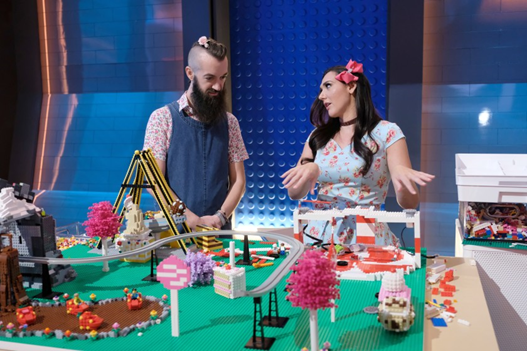
LEGO MASTERS (FOX)
FOX’s LEGO MASTERS is appropriately awkward given the subject matter. After all, even though LEGO as a brand might have become more fashionable in recent years after Phil Lord and Chris Miller made THE LEGO MOVIE a four-quadrant hit, the idea of the “adult LEGO builder” is still only a half-step above “Dungeons & Dragons player,” or worse, “Funko Pop enthusiast,” in regards to coolness. Subsequently, the adult LEGO builder is as good a place to mine for network reality TV fodder as anywhere else, wholesome but weird enough for a competition show meant to push genuine nerds to the edge of sanity. And I say all this endearingly—while I rarely build myself anymore, the brand was a massive presence in my childhood, and the lack of LEGO in my adult life stems more from a lack of space and a lack of disposable income than it does a lack of desire. I’m clearly not in the minority as FOX has discovered.
LEGO MASTERS has a lot going for it. The cast of competitors are that appropriate mix of wholesome and weird, engaging enough to pick apart for reality television without carrying the competitive malice that would turn away the obvious demo, kids (it’s unclear at times if kids actually are in FOX’s targeted audience). The actual structure of the show is solid enough, teams of two finding a prompt umbrellaed under a larger theme and given a time limit to build a structure that fits that theme. The pilot finds the teams having to build a section of a theme park, a nice showcase for the kind of creativity you should expect. Those prompts are sometimes slightly unclear, frequently revolving around a “show don’t tell” storytelling goal that feels flimsy, with its two main judges (both LEGO masters) doing so-so jobs at communicating criticism and feedback on end products that range from obviously disqualifying (broken, poorly built) to simply bad in the judges’ eyes (doesn’t “meet” the prompt, wasn’t built in the direction they’d have gone with). Will Arnett is an appropriately awkward host, feeling his way in the dark during the Q&A portions with the contestants while nailing the actual presentational moments, which makes sense given his background. Naturally a lot of the drama in the early episodes of the show is manufactured, but after several of the obviously weaker teams have been eliminated the show feels like it’s hitting a stride with more difficult builds and higher tension. The formula feels like it only has so much juice, but at the end of the day, if the goal is to showcase some pretty amazing LEGO sets with a side of competition, LEGO MASTERS is a success, pratfalls of network reality competitions be damned. [CJ Simonson]
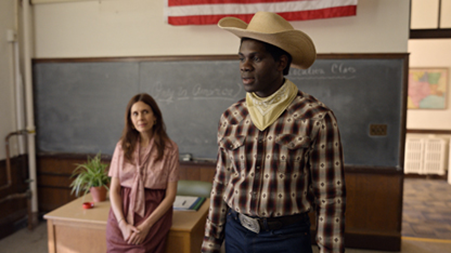
LITTLE AMERICA (Apple TV+)
Everyone has at least one incredible story. From your neighbor to the people you pass on the street, people you don’t know and have never heard of have stories that will fascinate you. That’s the operating premise of LITTLE AMERICA, a scripted anthology show on Apple TV + that focuses on modern stories about immigrants. Each episode follows a different protagonist who’s usually of different age and ethnicity. The episodes also all take place in different time periods, ranging from the 1980s to the late 2000s. But what really makes the show special is that each of these stories are real. Not only are these real events that happened to these people (with each episode ending with a photo of the real-life subject), but they’re all going through real, “relevant to today” struggles. These aren’t stories of CIA agents stopping World War 3 or a whistleblower leaking lies the American government told us. This is about celebrating everyday life.
The show is produced by Kumail Nanjiani and Emily V. Gordon, writers of THE BIG SICK, a story with its own immigrant narrative woven throughout. What’s impressive about their work developing LITTLE AMERICA is how the production found diversity in front of and behind the camera. Having a filmmaker whose experience is actually similar or at least relevant to the story they’re telling adds more depth and brings the show closer to its goal of realism without getting lost in objectivity. Each episode allows for different emotional scales. The first episode, about a young boy who took over his family business while his parents fought for American citizenship, is emotional and sad, tuned like a tragedy. Another episode about a college student coming to the states and becoming engrossed in cowboy culture is a bit more comedic, but still with some emotional heft. Watching the show is like sitting across from a complete stranger in a diner and having them recount a major event in their life. They’d talk about how they overcame their struggle and became stronger from it, how their life story could become motivational for someone else like them. LITTLE AMERICA isn’t focused on hardcore action or the melodrama of life and death, but instead the truly personal and authentic. These are the stories of Americans, not just the rich ones or the famous ones, but the ones that we see everyday. Something that’s far from a small feat to bring attention to. [Wyatt Lemoine]
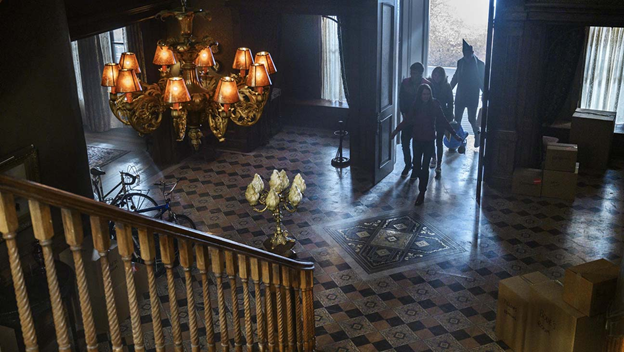
LOCKE & KEY (Netflix)
I’m a sucker for stories about kids exploring an unusual house full of magical secrets. I’ll take HOUSE WITH A CLOCK IN ITS WALLS over a Marvel movie any day. So when Netflix announced it would be adapting the small pond comic title LOCKE & KEY, I was pleasantly surprised and intrigued. From what I’d read of the comic, it favored dark, twisted stories over the usual whim and wonder. Would it skew towards adults, like the film THE TURNING? Or would it fall neatly into that 6-11 demo that every studio’s hungry for?
Well, the answer is… neither? LOCKE & KEY is a series at war with itself. Tonally all over the place, it veers capriciously from saccharine to straightforward horror. The season’s nameless villain, Dodge (Laysla de Oliveira), is hurt most by this oscillation. Sometimes, she’s interesting and sexy and wickedly dangerous. And the rest of the time? She’s utterly toothless. But, apart from Dodge, there are many aspects of LOCKE & KEY that held promise but fell woefully short—most of which danced around the characters and the magic of it all.
In the universe of L&K, keys serve as single-use magic wands. One key opens your mind. Another turns you into a ghost. A third allows you to change your gender. But like all fun and good things, these keys also come with a monkey paw effect. Sure, you can open your mind to visitors, but if you take something out (such as your fear, for example) you’ll be permanently changed. If the Ghost Key’s door is closed, you’ll be dead forever. So, for me, it was hard to buy into this show, because the part of it that’s meant to be fun seems more hazardous than the literal demon (Dodge) circling the main three children and their loop-de-loo mom (Darby Stanchfield).
Now we’re getting to the core of my beef with LOCKE & KEY: the characters. Poorly written. Even more poorly acted. It’s been a long time since I’ve watched something and actively mocked it through each episode. Most of my grief was directed towards Stanchfield, whose character I’ve dubbed “Space Cadet,” in lieu of actually learning her name. She’s cringy in an airheaded-blonde kind of way. But it’s not just Stanchfield… most of the characters are so out-to-lunch that they’re not aware of anything that’s going on around them. The audience is often way ahead of the protagonists, and not in a good way. Watching this show felt like I was at the finish line, tapping my foot and checking my watch, as I waited for everyone else to catch up.
I wouldn’t recommend LOCKE & KEY to anyone. Not children, not adults. It doesn’t seem like it’s really for anyone. It exists solely for the nebulous zone of Netflix where all bad TV goes to die. At most, it might be one of those titles you watch while high to kill time. But if you’re looking for a fun time, try another door. This key’s bust. [Tracy Nicoletti]
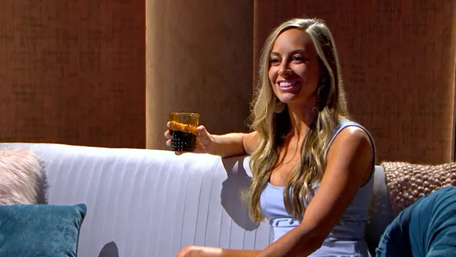
LOVE IS BLIND (Netflix)
As we all know (and agree, begrudgingly), our golden age of television has curdled into something else. Shows like THE SOPRANOS, BREAKING BAD, and MAD MEN cemented prestige television as the cream of the crop, but everything that’s come after has varied wildly in quality. And in-between, filling in the gaps in programming schedules, there are the shows doing the thankless job. The shows that everyone laughs at, but ravenously consumes: reality dating shows, unsung heroes of peak TV. We all love THE BACHELOR and THE BACHELORETTE, but as those have grown stale something a bit more relaxed and less formal seems far more attractive. A reality dating show where people can let their hair down, a show like FLAVOR OF LOVE, ROCK OF LOVE, or I LOVE NEW YORK. LOVE ISLAND is good, but casual to a fault, with too many episodes and a messy structure. Could you name a moment in THE BACHELOR that was nearly as iconic as when Pumpkin spit on New York? Or when Buddha returned to everyone’s surprise on the same show? Our memories of these messes have been the only thing to keep us going these last few years. However, thanks to Netflix, an heir apparent approaches.
LOVE IS BLIND is some of the most fun this writer has had with television in years. A group of men and a group of women walk into different rooms, going on dates with each other, but separated by a thin wall so that they have no idea what the other looks like. As soon as the show starts, the stakes are high. This isn’t just dating, this is dating to marry, all without seeing each other until the engagement. But what reality dating show is good without drama? My goodness, does this show bring the drama! Two men falling for the same woman, a contestant getting cold feet when they see the “love of their life” in person and even contestants getting all the way to their wedding and having to abandon ship.
Some readers will see this as trash television. And while it’s not as obviously artful as GAME OF THRONES thought itself to be and FLEABAG often was, does it truly matter? This is a show for social interactions. It’s not a show that’s talked about at the water cooler the next day, but more of a show for inviting five of your friends over and providing your own brainworm-addled live commentary. This is the type of show where you laugh at men struggling to “woo” women without seeing their faces by saying comments like “You sound so sexy right now” even though most of us probably wouldn’t know what to say either. There’s a lot of great comedic characters in television history, but most of those characters don’t hold a candle to people in real life, and people in real life don’t hold a candle to the people in LOVE IS BLIND. [Wyatt Lemoine]
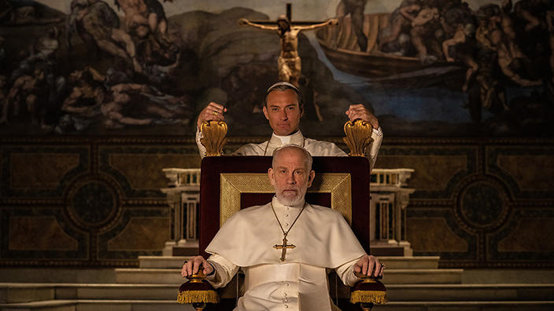
THE NEW POPE (HBO)
Sometimes with prestige TV, it’s hard to tell when weird stuff is just weird for the sake of being weird, or if it’s actually operating on a deep metaphorical level. With THE NEW POPE, I can’t really tell. Take the theme song, for example. Is it a commentary on the secret profanities of the Catholic Church, or is it just nuns doing sexy dancing to club music? Much of my energy while watching this was spent trying to figure out what exactly the show was trying to say, if it was trying to say anything at all.
THE NEW POPE begins where 2016’s THE YOUNG POPE left off. Jude Law’s scandalous Pope Pius XIII has just fallen into a coma after suffering an unexpected heart attack. His body has rejected three new hearts and his future looks grim. Cardinal Secretary of State Angelo Voiello takes center stage as he tries to manipulate the election process so that either he himself or someone under his control becomes the new pope. Things seem to be going his way until his new pope selection goes rogue and starts giving away all the Vatican’s wealth to the poor. The pilot ends with the new pope suffering a heart attack while Pope Pius wiggles his finger, further throwing Voiello’s plans into chaos and once again creating a papal power vacuum.
I honestly don’t know what to make of THE NEW POPE. The level of backroom shadiness and power-hungry leaders reminds me of early HOUSE OF CARDS, but a lot of footage feels like it was just included to be weird for the sake of weird. I watched the first three and while the plot is gripping enough, it often takes a backseat to silent cinematographic oddities. I think it boils down to this: If you enjoy the Catholic aesthetic and like watching rich people tear each other down, you’ll enjoy this. [Dan Blomquist]
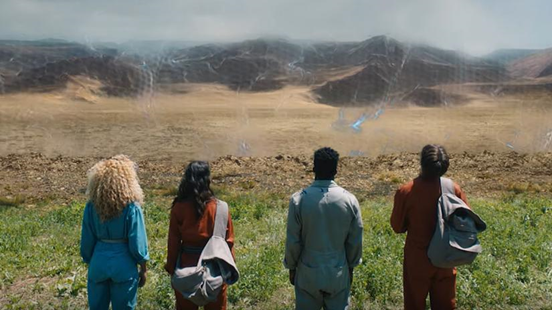
UTOPIA FALLS (Hulu)
Fully. Automated. Luxury. Gay. Space. Communism. Hulu’s latest sci-fi original series imagines a utopian future where the most important societal concern is the Exemplar competition, which is basically AMERICA’S GOT TALENT without the novelty acts. The competitors all live together reality show-style and already kind of know each other from living in the same communes. It’s remarkably corny and devoid of any real tension or humor, but for some reason I enjoyed watching it. The music montage kind of slapped and at the end, main characters Aliyah 5 and Bohdi 2 discover a library of artifacts from the Before Times AKA real life. The “voice” of the library is Snoop Dogg, who guides Aliyah and Bohdi through a brief history lesson on hip hop set to “Juicy” by Biggie Smalls. There’s set up for a vague existential threat to the society, but the pilot spends almost all of its time on the highs and lows of the talent show. While I don’t think it’s worth investing another nine hours, UTOPIA FALLS could potentially be a pleasant diversion for sci-fi lovers who wonder what THE GIVER would be like with a musical competition. [Dan Blomquist]
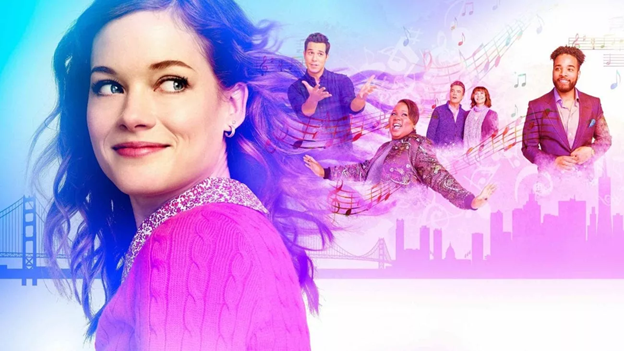
ZOEY’S EXTRAORDINARY PLAYLIST (NBC)
I wasn’t sure what to think when I heard the initial pitch of ZOEY’S EXTRAORDINARY PLAYLIST (ZEP). When an MRI goes awry, a quirky, pixie dream girl coder suddenly inherits the ability to hear everyone’s innermost thoughts… as a musical number. What what what? Cue animated cartoon eye-bulge. It’s certainly unique. I daresay, even crazy. But fuck me, it actually works.
Yes, the set-up is more like a lunge than a stretch. It’s laughably stupid. But once you push past the initial plot contrivances, the show’s fun. It’s upbeat, quirky, and bonkers in a colorful, PUSHING DAISIES kind of way. It’s a breath of fresh magical realism in a market saturated with bad sitcoms. I’m just going to go ahead and say it—ZEP fills the hole THE GOOD PLACE left when it bowed earlier this year. ZEP isn’t going to throw you any morality curveballs or thought-provoking messages. But it will make you cry… a lot.
ZEP’s main message is about connecting with others through empathy and how everyone suffers in their own way. While ZEP does deal with themes of loneliness, depression, and anxiety, the show never really feels like it gets heavy. It’s a cute melodrama that leans heavily on its cast. And while it’s nowhere close to mind-blowing, ZEP always leaves me feeling a little bit lighter. The songs and musical numbers are no Broadway smash, but I like guessing which songs will come up each week. I, for one, can’t wait to keep this show on shuffle. [Tracy Nicoletti]




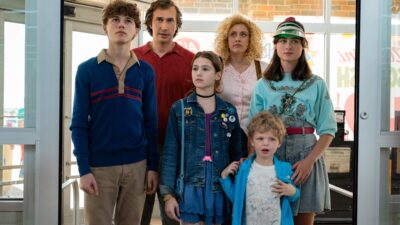
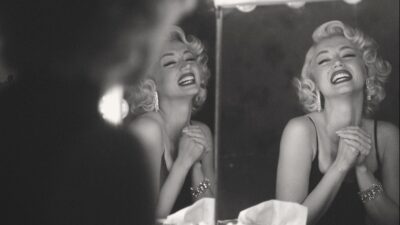
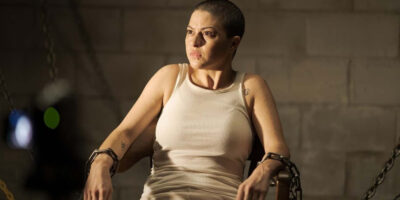



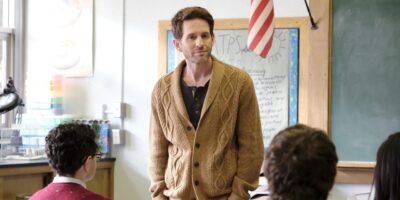
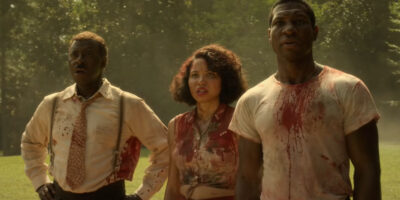




Comments